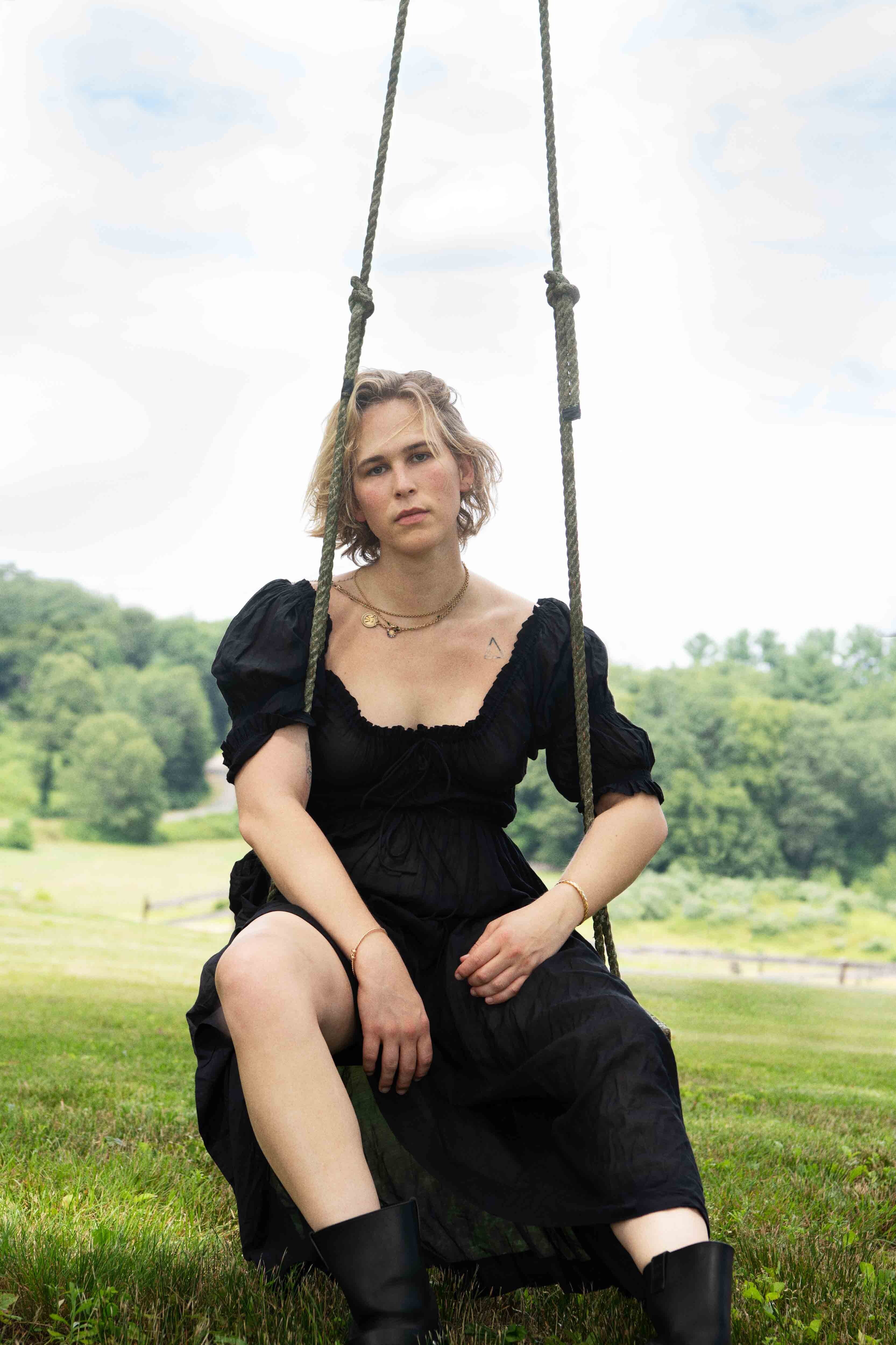Tommy Dorfman’s Return to Acting Is Anything But Tragic
The actress makes her Broadway debut in 'Romeo + Juliet' playing two distinct characters, but for Dorfman, the roles are a manifestation of her own coming-of-age.


Tommy Dorfman is in the middle of a two-show day.
The actress had recently completed a matinee when we meet at a bright and bustling coffee and tea shop across the street from the Circle in the Square Theatre in New York City where she's playing the dual roles of both the Nurse and Tybalt in the buzzy Broadway revival of Romeo + Juliet. The spot—which sells elaborate drinks and Chinese-French fusion pastries, some in the shape of Powerpuff Girls—is a favorite of the cast; so much so that Dorfman bought her colleagues gift cards from there as an opening night present, which she is picking up when we visit that Wednesday afternoon.
Just after we chat, the 32-year-old, wearing a Yankees cap and an artfully ripped burgundy sweater, will head back to her dressing room to prepare for the evening performance. She has never done an interview in this interim period between shows before. "So if my show is terrible…" she jokes, before adding, "No, I'm kidding. To me, it feels fine because I have enough time after this interview to go home—go home? Go to my dressing room—and sort of reground and recenter myself."

Dorfman poses in a promotional shot for her forthcoming memoir Maybe This Will Save Me.
It's a time of firsts for Dorfman, who rose to recognition in 2016 playing Ryan Shaver in the Netflix teen soap opera 13 Reasons Why. This edgy Romeo + Juliet, which stars Kit Connor and Rachel Zegler in the titular roles and features music from Jack Antonoff, marks her Broadway debut as well as her return to acting in a major way. She took a break from being in front of the camera when she started her transition, which she announced publicly in Time magazine in 2021. Since then, she has directed her first feature film I Wish You All The Best, which premiered at SXSW earlier this year. She also wrote a memoir Maybe This Will Save Me (due out next year) and is working on her second movie as a director, an adaptation of the graphic novel Laura Dean Keeps Breaking Up with Me. Earlier this morning she was watching actors do chemistry reads for that project.
Still, Broadway remains her primary focus right now.
"It's been so cool sharing this story with people and also sharing my art with people in this way because I haven't in so long," she says. "Art sometimes is just for yourself, sometimes it's meant to be shared, sometimes it's not meant to be shared. Acting on stage is meant to be shared. It's an offering for the audience."
Sipping an iced dirty rose chai latte with almond milk and playing with an extra straw, Dorfman explains how director Sam Gold recruited her to play two of the most crucial characters in Juliet's life: the Nurse who cares for the teen and who has fallen madly in love with a boy from an opposing family, and the cousin who that boy is later responsible for killing. Dorfman initially auditioned for a completely different character, and then Tybalt. Playing the Nurse was a surprising last-minute suggestion that Gold brought to Dorfman.
Get exclusive access to fashion and beauty trends, hot-off-the-press celebrity news, and more.

Dorfman as Tybalt, opposite Kit Connor as Romeo, in a dramatic Romeo + Juliet scene.
"I never would have thought anybody would let me do that," she says. "Not thinking about age or anything like that, because obviously our show is different in that way, but more just as a trans woman playing the Nurse in Romeo and Juliet, it just felt like a sort of self-limiting thing. I could have read the script 4,000 times, and I could have been asked what I wanted to audition for 4,000 times, and the thought of the Nurse would have come to my brain, but I would have never probably said it."
But Dorfman also had to consider what these parts would require of her emotionally night after night; what it would be like to die on stage for six months and experience the kind of immense sorrow the Nurse does. Ultimately, Dorman felt ready for the opportunity the play provided. "They're both very different than me and yet I really relate to them in a lot of ways."
I think I'm living maybe what I manifested in 2021...I'm a woman playing an iconic male character in the canon of the history of theater.
Not to mention, there are also practical aspects that Dorfman must contend with when it comes to executing the play’s intense fight sequences several times a week. She recently sprained her ankle falling off the stage right before Tybalt's death scene in the middle of a performance.
"I took a few deep breaths, and I stood up as I started to say my next line, and I was like, oh, I can't really walk," she says. "Everyone knew that I had fallen so the whole cast kind of helped me."

Sam Gold's Romeo + Juliet is a Gen Z take on the classic Shakespeare play, with the actors staged extremely close to the audience.
But there are also more internal ways she moves between the two personas—one arguably the most maternal character in the play and the other the most violent—from scene to screen. Tybalt, she explains, comes from the lower half of her body, while the Nurse exists in her heart and throat. As the Nurse, Dorfman wears a tiny black miniskirt and chatters away breathlessly; when she's bomber-jacket-wearing Tybalt, Dorfman's face drops into a solemn look of menace. The switching gives Dorfman the opportunity to try something she had always admired ever since she was a teen watching Toni Collette play a woman with dissociative identity disorder on the Showtime series The United States of Tara. "Those types of performances always really stood out to me as the most visceral and exciting," she says.
When Dorfman publicly came out as trans in an interview with the author Torrey Peters, she said, "I’m no longer interested in playing 'male' characters—except for maybe in a 'Cate Blanchett playing Bob Dylan' way."
But when asked what she thinks about that now: "I think I'm living maybe what I manifested in 2021. I mean, I'm not Cate Blanchett, and I'm not playing Bob Dylan, but I'm a woman playing an iconic male character in the canon of the history of theater. And Shakespeare is genderplay anyway."

Like Dorfman, Romeo + Juliet stars Kit Connor and Rachel Zegler also make their Broadway debuts in the show.
Dorfman, however, is also conscious of how her presence might make an audience feel, in part because she's been talking with fans who throng at the stage door after curtain call waiting for selfies and signatures. (The best preparation for that element of Broadway was her time on a teen soap opera, she quips.)
"There are going to be trans people who see me playing Tybalt who feel a certain way," she says. "There are going to be transphobic people in this audience who see me playing Tybalt and the Nurse and feel a certain way. There are going to be people who are incredibly triggered by a six-plus foot man killing a trans woman on stage even though she's playing Tybalt in the context of this play." Part of the job, at times, means having "conservative eyes landing on a trans body."
Due to the nature of Gold's staging the actors are extremely close to the audience, especially in the pre-show where they mingle on stage. When I saw it a week prior, Dorfman was nearly in my lap as she flopped onto an inflatable couch. She was afraid of those moments at the beginning of the run, but now, as she approaches opening night, she appreciates the routine, finding it ritualistic to take in what's happening around her. One night, she spotted Rosie O'Donnell in the crowd. "I was like, oh shit, okay, right, I'm on Broadway."
I think part of transitioning in adulthood is going through a sort of second puberty.
As the hour nears Dorfman's call time we move outside so she can have a cigarette and multitask. In addition to Romeo + Juliet, a classic tale of youth in revolt, her return to Hollywood has focused on a lot of coming of age stories. (Her film I Wish You All The Best centers on a nonbinary teen struggling with anxiety and coming out.) "I think part of transitioning in adulthood is going through a sort of second puberty," she says, lighting up.
To her, these works feel like they are in conversation with each other, but she'll probably be "rounding out in the next couple of years my coming of age mentality." She adds: "I'm more interested in the stories that I'm telling and then figuring out how I can participate in telling them, which is why I was okay not acting for so long. Because I was like, well, there are other ways I can tell stories," she says. "And I really didn't want to act until I felt ready to come back."
She's ready now. As we depart she says, "I'm going to go be on Broadway right now, which is the coolest thing I get to say every day. So cool."
Esther Zuckerman is a freelance entertainment journalist and critic. Her work appears in the New York Times, GQ, Bloomberg, the Wall Street Journal, the Los Angeles Times, Indiewire, and Time among others. She is the author of three previous books: A Field Guide to Internet Boyfriends: Meme-Worthy Crushes from A to Z (2021), Beyond the Best Dressed: Cultural History of the Most Glamorous, Radical, and Scandalous Oscar Fashion Hardcover (2022), and Falling in Love at the Movies: Rom-Coms from the Screwball Era to Today (2024).
